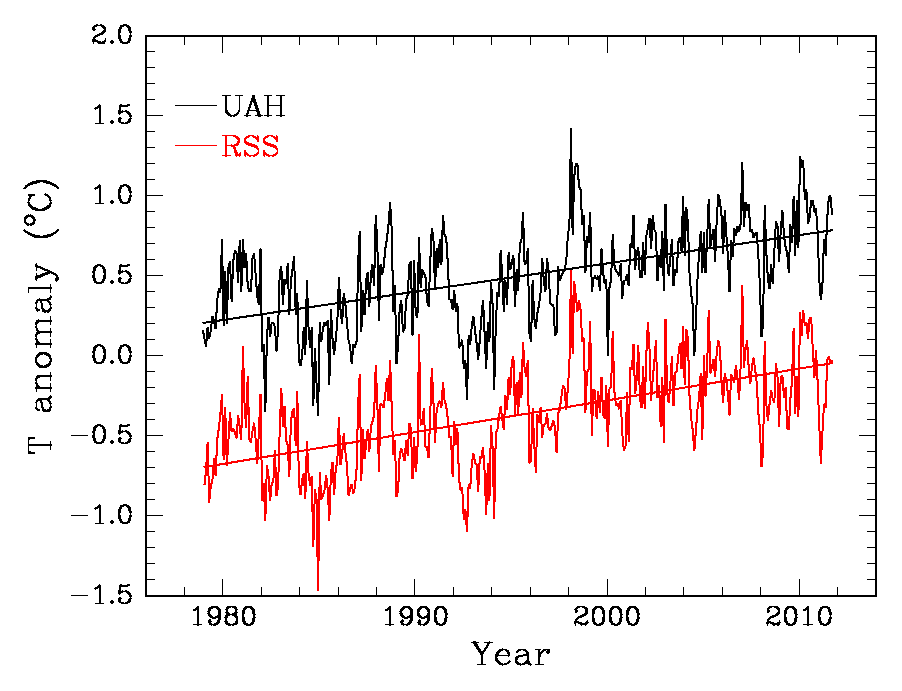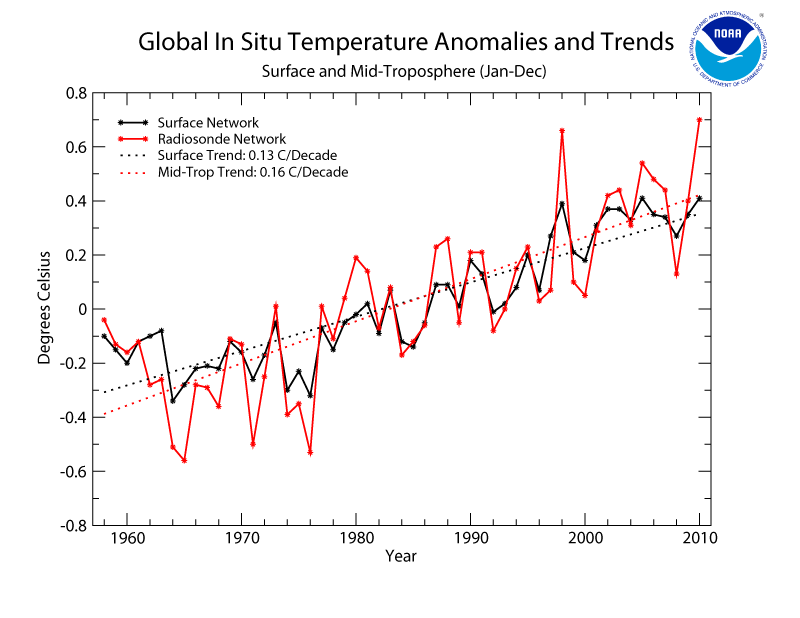Fred Singer Denies Global Warming
 Waiting for the dust to settle, we still see a host of different reactions to BEST's results. The very first shouts from many skeptics has been along the line of "no one has ever claimed that the planet is not warming," although we know that despite the settled science that is global warming, in many instances this is not true.
Waiting for the dust to settle, we still see a host of different reactions to BEST's results. The very first shouts from many skeptics has been along the line of "no one has ever claimed that the planet is not warming," although we know that despite the settled science that is global warming, in many instances this is not true.
Following the skeptics blogsphere, a kind of schizophrenic pattern emerges. On the one side they say that it's true that the planet has warmed; on the other, they criticize BEST's results for showing exactly this. And given that BEST substantially agrees with all the other datasets, they are implicitly saying that all datasets are biased in exactly the same way and amount. In the end, if skeptics say it's warming, it's fine; when scientists measure the warming, it's a hoax. I miss the logic.
As it often happens, there will always be "extremists." Contradicting their skeptic allies, we now see more and more people maintining the indefensible position of "it's not warming"; between them, the well-known "skeptical" scientist Prof. Fred Singer, Emeritus at the University of Virginia. He took issue with an editorial recently published on Nature, and left a comment in their blog for the record.
Apart from the all-too-common accusation of bias, Singer finds surprising that Nature welcomes BEST's results. He says that these new results "added little to the ongoing debate on human causes of climate change," which I find somewhat trivial. Indeed, any confirmation of a scientific finding in some sense "adds little" but "subtract something" - it leaves less room for alternative hypotheses. If you like the word "add" more, I may say that it adds confidence on previous results, but it's semantics.
On the scientific side, Singer says that "They included data from the same weather stations as the Climategate people." I'm not going to comment on his referring to the "Climategate people" - it's really irritating to see what should be a scientific discourse turned to innuendo. Anyway, he's entitled to his opinion and his style; the real problem is with the claim that BEST includes the same stations as GISS or HadCRU. Let's see what they say:
"We are using over 39,000 unique stations, which is more than five times the 7,280 stations found in the Global Historical Climatology Network Monthly data set (GHCN-M) that has served as the focus of many climate studies."
They share less than 20% of their database with others, and they started from scratch using the raw (unudjusted) data and implemented a new method. It's worth noting that the BEST team has been careful enough to provide a comparison with other datasets analising only stations not used by other groups (fig. 1 here). Singer's attempt to cast doubt on BEST results based on the common use of the GHCN has then no merit.
Singer then continues his attempt to undermine station based datasets by claiming that
"unlike the land surface, the atmosphere has shown no warming trend, either over land or over ocean — according to satellites and independent data from weather balloons."
What is the atmosphere for Prof. Singer, the whole atmosphere or just the troposphere, is not clear. Assuming he's referring to the latter, all of the lower tropospheric satellite datasets show warming. For example, we can easily check UAH and RSS datasets just plotting the data.

Those interested can find a thorough comparison of the different datasets here.
What about the mid-tropospheric trend from radiosonde? Same story, it's warming and at a similar pace as surface temperature:

Singer's claim, again, does not withstand scrutiny.
His last try is with tree rings, ice cores, ocean sediments and stalagmites; he claims that "They don't show any global warming since 1940!". Yes, you read it right, since 1940. I admit I was astonished reading this. I've heard many times of the global warming stopped in 1998, or 2002 or whatever, but never as early as 1940; it must be a record.
I also find intriguing that Singer likes proxies more than direct measurements, more so given that he complained about the area coverage of the land stations. Do ice cores, for example, have a better coverage than weather stations? And why should one use ocean sediments to infer land temperature? The quoted proxies are typically used for long-term temperature reconstructions for a reason, not as a substitute of direct measurements; would you prefer direct radiometric measurements of solar irradiance or plant growth as a proxy?
Proxies are much less accurate than thermometers, do not have a good area coverage, are noisy and often need heavy filtering thus reducing their time resolution, and may be affected by several things other than temperature. No one would throw direct measurements away and keep a much less reliable indirect one.
This is Singer's quite unsound science as per his comment on Nature's blog, but there's another thing worth noting. Presuming that the Nature editors "evidently haven't read the four scientific BEST papers," he tries to fill the gap by quoting the Berkley scientists as saying that "The human component of global warming may be somewhat overestimated." Note that the quoted sentence starts with the "T" in capitals.
What is actually written in the paper (pag. 12) is "In that case the human component of global warming may be somewhat overestimated," where the case is the hypothesis of the Atlantic Multidecadal Oscillation driven by natural variability as opposed to forced by GHGs. The meaning of the sentence has been completely twisted; I hope that Singer took the quote from someone else and didn't read the paper himself, for if he did the conclusion to draw could be much worse. Note in particular the wording "may be somewhat overestimated" - the language is hypothetical because BEST did not actually attempt to determine if it's true that the human component is at all overestimated, and thus to focus on and exaggerate the importance of this totally unsupported hypothesis is rather foolish.
In summary we count two errors (on stations overlap and on the trends of satellite and radiosonde records), one unthinkable request (substitute all the direct temperature measurements with proxies), and one misquoted or misunderstood (or worse) sentence. I understand that it's just a blog comment but before dismissing the work of collegues and accusing a scientific journal of being biased, I'd expect a reputable scientist to think twice.
Posted by Riccardo on Wednesday, 2 November, 2011
 Waiting for the dust to settle, we still see a host of different reactions to BEST's results. The very first shouts from many skeptics has been along the line of "no one has ever claimed that the planet is not warming," although we know that despite the settled science that is global warming, in many instances this is not true.
Waiting for the dust to settle, we still see a host of different reactions to BEST's results. The very first shouts from many skeptics has been along the line of "no one has ever claimed that the planet is not warming," although we know that despite the settled science that is global warming, in many instances this is not true.


